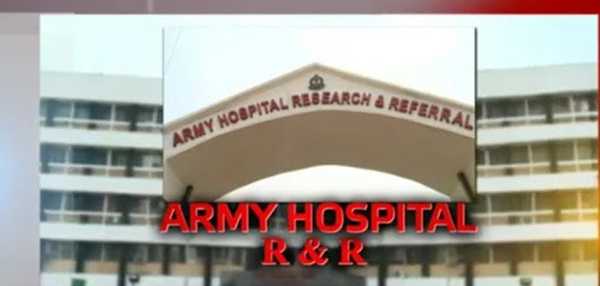NEW DELHI, Jun 22 : The state-of-the-art Army Hospital (Research & Referral) has set the wheels in motion for a significant expansion in its infrastructure with three new medical centres for oncology, ophthalmology and orthopaedic and joint replacement set to come up in its sprawling campus here in the next one to two years.
Lt Gen Ajith Nilakantan, Commandant, Army Hospital (R&R), said this during an interaction with a group of mediapersons on the AHRR premises on Saturday.
The 1200-bed hospital is a “quaternary” facility and provides treatment largely to the patients referred to it from tertiary or similar-level hospitals, he said.
With its campus in Delhi spread over 256 acres, it is the apex medical institute of the Armed Forces Medical Services (AFMS).
“No hospital can be updated and remain relevant if it doesn’t expand and keep in touch with the latest advances in technology and facilities. That is why we have recently started the construction of a full-fledged oncology (cancer) centre with all the latest facilities, an ophthalmology (eye) centre is being constructed and also an orthopaedic and joint replacement centre also being constructed,” the AHRR commandant said.
“We hope that in the coming one to two years these will be ready,” he added.
The three new centres once completed will give a boost to the medical infrastructure and services offered by the hospital, which has been located at its current campus here since the late 1990s.
The AHRR had recently announced the opening of a skin bank facility, a first-of-its-kind facility to be established within the AFMS.
While the skin bank housed in its department of plastic and reconstrucive surgery was formally inaugurated on June 18 by DGMS (Army) Lt Gen Arindam Chatterjee, it had received its first skin donation on May 29, a senior official said.
This donor, a woman, was the mother of an army personnel and had died at the AHRR, another official said.
This skin bank is the first in the AFMS. In fact there are very few centres in the country which have a skin bank. Basically, it is for severe burns. Skin has to be replaced, otherwise, infection can prove fatal, said Lt Gen Nilakantan.
“It is very important to cover the exposed area and sometimes adequate skin may not be available with the same patient. So, we may have to take skin from somebody else and use it for an initial period until the base skin comes back. As part of our organ donation system, we have an armed forces organ retrieval system, it’s called AORTA (Army Organ Retrieval and Transplant Authority), and various organ donations are organised, and this is the latest where skin donation is also part of our…. And, it’s a licenced skin bank,” he said.
The AHRR commandant said it is being hoped that treatment of serious burn injuries will be augmented with this skin bank.
This bank will serve as a centralised hub for the collection, processing, storage and distribution of skin grafts, providing a “critical resource” for military medical centres across the country.
By establishing this facility, the armed forces are ensuring that the personnel and their families have access to the most advanced skin replacement therapies.
The visiting mediapersons were later also given a tour of some of its key departments, which have cutting-edge medical equipments such a high-tech simulator for eye surgery. Some of the mediapersons also interacted with the patients, who have recently undergone liver or heart transplant procedures at this hospital.
Lt Gen Nilakantan said the AHRR has “all the broad specialities, and all the super specialties, and altogether we have 35 departments, including specialities and super specialties departments”.
“We have about 300 doctors, and 300 nursing officers. Also, we have large number of outsourced paramedical staff, almost 1,000… Besides, 300 defence civilian,” he said in response to a query.
Asked what has been some of the lessons for the hospital from the COVID-19 pandemic, he said, firstly, “we had the advantage that we went for vaccination of frontline workers and our people were immunised (against Covid) at the outset”.
And, with that confidence, at most of the hospitals in the AFMS, “we endeavoured to make sure that while we treated Covid, we also did not stop treatment of other diseases”, the commandant said.
“This has been our endeavour. I can say it with pride that we did succeed to a large extent, including this hospital. Work here could be carried on to the fullest possible extent, with treatment of patients having other diseases as well,” he asserted.
“Today, we can look back and say that probably that is the way to get the whole infrastructure, medical establishment to work, in case we face similar situation in future. We were quite fully functional except for a brief period. Now, we are wiser, and next time it happens, we will be better,” the commandant said. (PTI)


